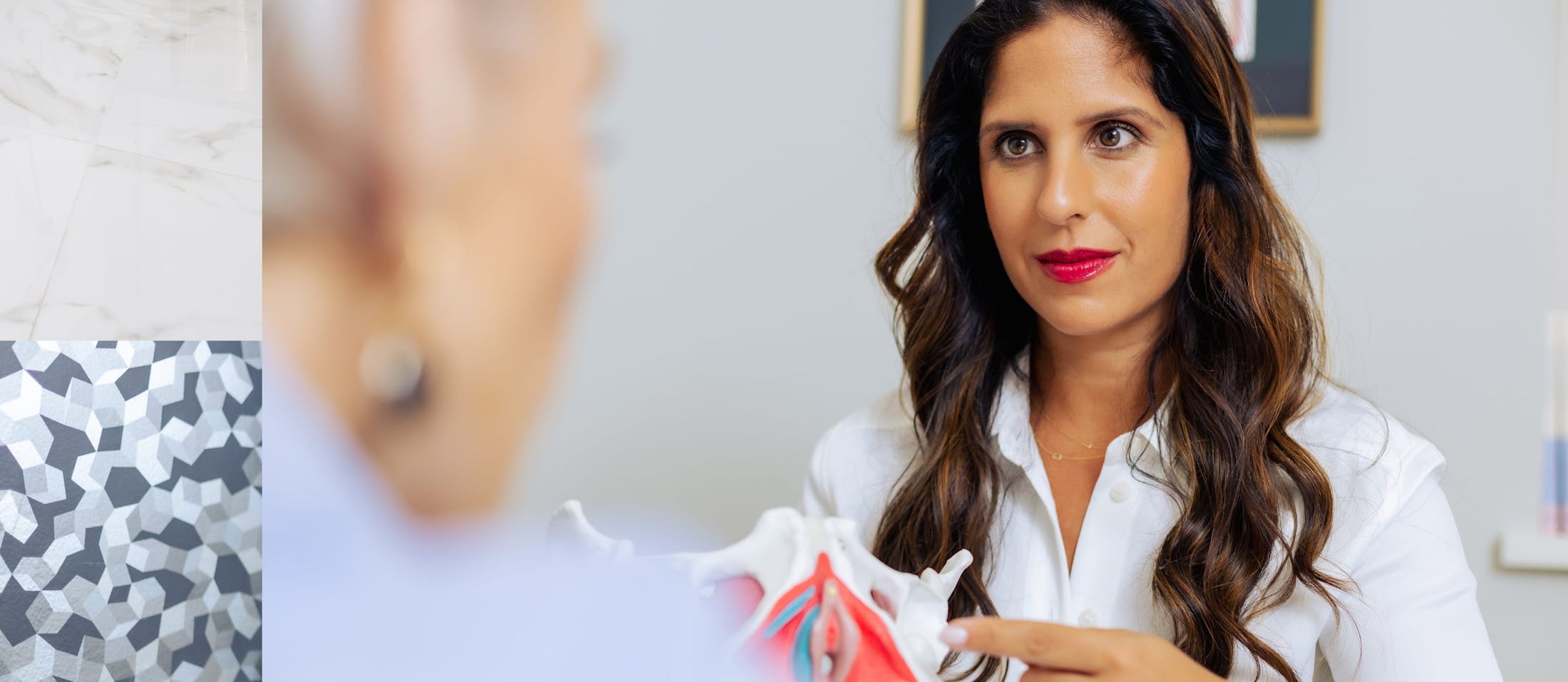
Table of ContentsPostpartum Sex and Pain: What’s Normal, What’s Not & How to Find ReliefMyths About Sex After C-Section or Vaginal BirthCommon (Yet Under-discussed) Causes of Postpartum Sexual PainHow to Find Relief for Postpartum Sexual Pain
Postpartum Sex and Pain: What’s Normal, What’s Not & How to Find Relief
Hey mamas and birthing parents, this post is for you. If you’ve recently had a baby and you’re slowly starting to feel like yourself again, you might be feeling ready to get back between the sheets. That’s great news and an important milestone of any postpartum journey! But just like with all things pregnancy and postpartum, you probably have a million things on your mind. Maybe you’re wondering when can I have sex after giving birth? Will sex feel the same post-baby? Will having sex after baby hurt? Will I experience postpartum sex pain after a c-section?
At Pelvic Pain Doc, we always say that sex should never hurt — but things are a little bit different when it comes to postpartum sex. Whether you’ve had a vaginal birth or a cesarean birth, sex can be a little painful or uncomfortable at first –but that doesn’t mean you have to live with it! Your body has been through so many physical and hormonal changes, not to mention the mental and emotional shift you’re going through as a new parent. It can take some time to get back to your pre-baby sex life, but Dr. Sonia Bahlani, New York’s pelvic pain specialist, is here to help.
In this post, we’ll share:
Myths About Sex After C-Section or Vaginal Birth
So you’ve gone through nine months of pregnancy (more or less) and now you’ve finally settled into some kind of routine with your little human. After your six month check up with your doctor, you and your partner set aside some time to be intimate for the first time after giving birth … but it doesn’t go quite as you hoped. Maybe you experience vaginal dryness or maybe having sex after baby is downright painful. The first thing you should know is that this type of pelvic pain is totally normal and there is nothing wrong with you, but that doesn’t mean you have to accept it as a way of life.
This is just one of the many myths of the fourth trimester: many new moms are told that after their six-week check-in, they’ll be free to resume normal activities, like sex and exercise, just like before they had a baby. Unfortunately, this creates unrealistic expectations for the postpartum mother. There is nothing magical that happens at six weeks postpartum — in fact, you’re still in the thick of recovery, for both c-sections and vaginal births. And, if left untreated, pelvic pain during postpartum sex can last for months or years.
Another myth is that you’ll only experience painful sex after vaginal birth and not after cesarean birth, but this is simply not true. Regardless of how you give birth, your pelvic floor supports your uterus and baby throughout your pregnancy, and pelvic pain after c-section, particularly during sex, is very common.
There’s also an unrealistic expectation that you’ll even want to have sex after six (or eight or ten) weeks, when in reality, it may take much longer than that to have an interest in being physical. Between breastfeeding or bottle feeding, contact naps or co-sleeping and general sleep deprivation, there are many reasons for moms to feel touched out, so having sex may be the last thing on your mind. Once again, this is totally normal and it’s important to be patient with yourself and wait until you’re mentally, physically and emotionally ready to have sex after baby.
Common (Yet Under-discussed) Causes of Postpartum Sexual Pain
When you do decide to have sex after giving birth, it can be an incredibly emotional experience. For both vaginal births and c-sections, you’re probably still getting used to a changed body, and allowing yourself to be vulnerable with your partner may present some unexpected challenges. You’re also recovering from a significant physical experience and your body needs time to heal. Here are just a few reasons why sex might be painful after giving birth:
Hormonal changes: Low levels of estrogen can cause vaginal dryness after birth, which can lead to pain with penetrative sex. Tears or episiotomy: If you experienced vaginal tearing of any degree during birth, or if you had an episiotomy, you may have scar tissue that makes sex more painful. You should also always wait until your tears or stitches are fully healed before attempting penetrative sex. C-section: Pelvic pain or pain with sex after c-section is common but not often discussed. On top of recovering from pregnancy, you’re also recovering from major abdominal surgery. Often, c-sections are unplanned and can take an emotional toll as well, so it’s important to give yourself time, patience and compassion when easing back into your sex life. Breastfeeding: Breastfeeding lowers your estrogen levels, which may lead to vaginal dryness. The hormone prolactin, which aids in milk production, also inhibits dopamine, which may make it more difficult to become aroused. Emotional distress: Maybe you’re still adjusting to your postpartum body, maybe you experienced a traumatic birth or maybe the thought of having sex after giving birth simply stresses you out. Psychological factors always play a role when it comes to sex, often without our even realizing. Exhaustion: Let’s not forget that you and your partner are likely both exhausted from your new, very demanding little family member. Sleep deprivation can lower your libido which can in turn lead to sexual discomfort. Hypertonicity of the pelvic floor: Sometimes birth (vaginal or c-section) can unmask latent trigger or tender points in the pelvic floor. This can make pain with penetrative or deep intercourse very painful. It’s very important to seek care as there are so many treatment options that can help.
How to Find Relief for Postpartum Sexual Pain
It can be incredibly discouraging to experience postpartum sex pain. And the experience of painful sex can ultimately make you want to avoid sex altogether, which can then create a pain response. For example, if every time you have sex after giving birth is painful, you’ll be less likely to want to try having sex. This fear of pain during sex can cause your body to react negatively to sexual situations, thus creating more pain.

If this sounds like you, you are not alone. This type of postpartum pelvic pain is very common — and better yet, it is very treatable! For some people, at-home remedies will be sufficient in treating postpartum sex pain. For others, working with a pelvic pain doctor can help you find the right combination of therapies to get you back to enjoying sex again.
Here are some ways to treat postpartum sex pain, on your own or with your partner, or with the support of a pelvic pain specialist:
Self-exploration: For better or worse, your postpartum pelvic floor is not the same as it was pre-baby. Take some time to get to know your new pelvic floor by using your fingers or vaginal dilators to explore what hurts and what doesn’t. That way, you’ll be better able to explain to your partner what you need. Talk to your partner: Having an open conversation with your sexual partner can go a long way in overcoming pain during postpartum sex. Set aside some time to discuss your experience and tell them specifically what hurts or feels good when you have sex. From there, you can work together to find ways to make sex more enjoyable. Foreplay before penetrative sex: Foreplay is no longer a nice-to-have — it’s a necessity! (I mean, wasn’t it always?) Between dryness and a slower arousal response, your postpartum body needs a little more time to ramp up before penetration. Again, talk to your partner and get clear on what you need to feel primed for sex. Lubricant: Since hormones can get in the way of your natural vaginal lubrication, using personal lubricants can help reduce pain during postpartum sex. Check out some of Dr. Sonia Bahlani’s favorite lubricants here. Pelvic floor physiotherapy: Your pelvic floor is a band of muscle tissues that goes through a lot of stress during pregnancy and childbirth. But just like any other muscle, it can absolutely be rehabilitated with physical therapy. Psychological support: At Pelvic Pain Doc, we take a holistic approach to treating pelvic pain. This means we consider all factors of a patient’s health — physical and emotional — to address their symptoms. Dr. Bahlani often works in conjunction with psychologists and counselors to make sure her patients are getting the support they need to heal. Medications and procedures: In some cases, topical or oral medications can help et patients on their way to not just painless but enjoyable sex! In addition, at Pelvic Pain Doc, we offer a multitude of in-office procedures that can be helpful, including Botox, blocks and injections, when and if indicated. Corrective surgery: In severe cases, such as pelvic organ prolapse, surgery may be required to treat postpartum sex pain. Talk to your doctor about your options. While some pain during postpartum sex can be normal at first, it does not have to become chronic. If you’re experiencing painful sex after birth, contact Pelvic Pain Doc today.

